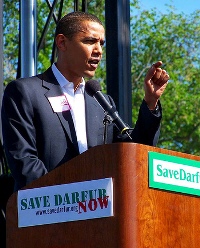Sudanese economists optimistic Obama to review sanctions
November 16, 2008 (KHARTOUM) – A number of Sudanese economists have expressed hope that the US president-elect Barack Obama would lift sanctions imposed since 1997.

The US first imposed sanctions on Khartoum in 1997 under former president Bill Clinton because of the North-South war and Sudan’s alleged sponsorship of terrorism.
Despite the 2005 Comprehensive Peace Agreement (CPA) that ended two decades of civil war in Sudan, the US refused to lift the sanctions because of the humanitarian crisis that erupted in Darfur.
The Bush administration working along with Congress in 2006 & 2007 expanded the sanctions as a result of intensification of the Darfur conflict.
Dr. Osman Al-Badri one of the economists interviewed said that “anything is subject to change” speaking on US policies towards his country.
“The Sudanese government must present itself in a rational and objective manner utilizing numbers and with confidence that carry mutual interests as well as mastering American English language especially that language allows us to reach common understanding” he said.
The former presidential adviser Dr. Esam Al-Sideeg stressed that unifying the internal front and resolving Darfur conflict is the key to influencing the new US administration.
Al-Sideeg gave an example of Gum Arabic which the US excluded from the sanctions on the grounds of “national interests”.
“Our dialogue with them should be based on mutual interests. They have wheat and we have Gum Arabic and other things” he said.
Another economic expert Dr. Mohamed Sir Al-Khatm echoed Al-Sideeg’s call and added that the government “must adopt policies supportive of its people”. He further said that any upcoming dialogue with Obama’s administration “must be based on understanding the American mentality”.
Last May the Bush administration started a normalization dialogue with Khartoum which ultimately collapsed under domestic pressure in the US.
A New York Times (NYT) said that Washington offered to remove Sudan from an American list of state supporters of terrorism and normalize relations if the Sudanese government agreed, among other steps, to allow Thai and Nepalese peacekeepers as part of the peacekeeping force.
In response to the report Obama issued a statement saying he was “deeply concerned” over reports that the Bush administration is negotiating with Sudan over normalizing ties.
The Democratic senator said that the US administration “should be holding the Government of Sudan accountable for its past promises to let UN peacekeepers operate within its borders”.
“Khartoum’s record of inaction and obstruction when it comes to the deployment of the AU-UN force must not be rewarded” he added.
Obama also said that the Bush administration “should be holding Sudan accountable for failing to implement significant aspects of the 2005 Comprehensive Peace Agreement (CPA), imperiling the prospects for scheduled multiparty elections in 2009”.
“For years, the Government of Sudan has thwarted the will of the United States and the international community, and offended the standards of our common humanity. Before we improve our relationship with the Government of Sudan, conditions must improve for the Sudanese people. We cannot stand down – we must continue to stand up for peace and human rights” he added.
The Sudanese ruling National Congress Party (NCP) considers the Democratic Party generally hostile to them. Obama is surrounded by figures considered “hawkish” in their view of the NCP.
Obama’s running mate Joseph Biden for example is a strong proponent of military intervention in the war ravaged region of Darfur.
Human rights groups have asked President-elect Barack Obama to pay early attention to the crisis in Sudan’s troubled Darfur region.
UN experts estimate some 300,000 people have died and 2.5 million driven from their homes. Sudan blames the Western media for exaggerating the conflict and puts the death toll at 10,000.
(ST)
